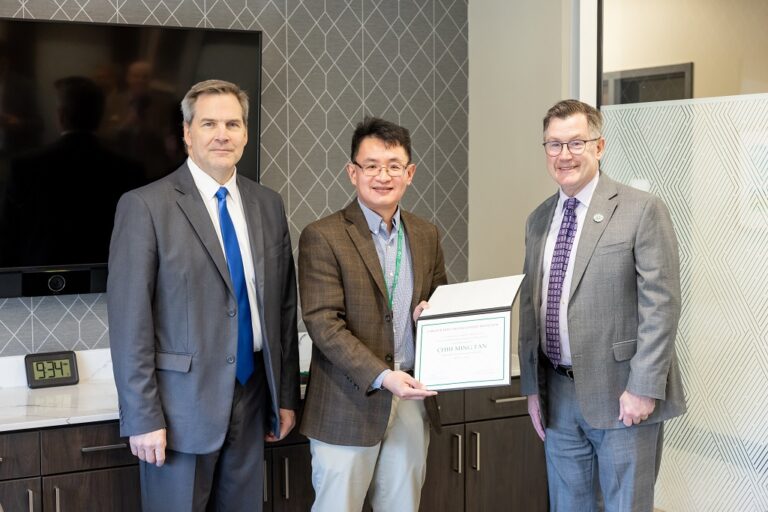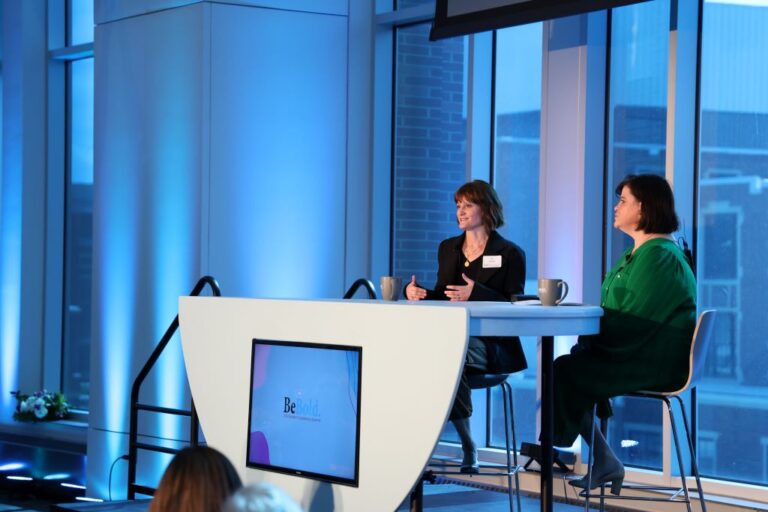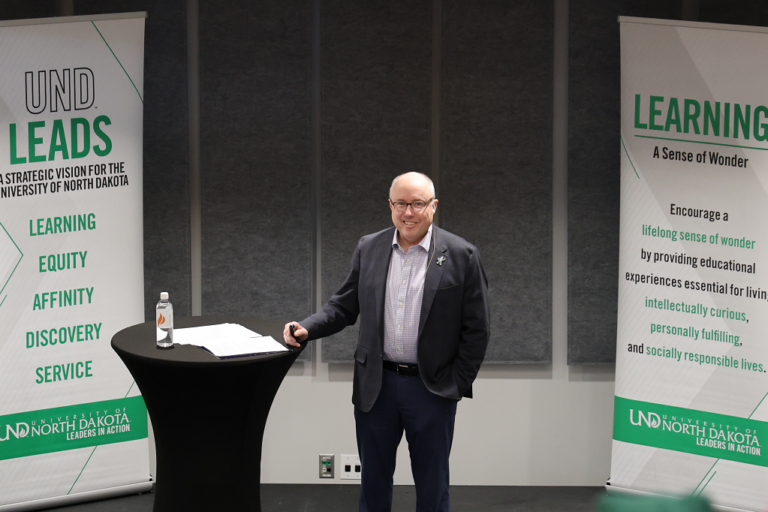With employers’ needs evolving, UND focuses on students’ job readiness
Through curricular changes and industry collaborations, UND is teaching students the power of ‘power skills’

“Power skills.” That’s how Brad Rundquist, dean of the College of Arts & Sciences at the University of North Dakota, describes the non-technical expertise students should possess in order to land a job after graduation.
Other terms that are also often used include “soft skills,” and “21st-century skills.” No matter what they’re called, these essential job skills boil down to “interacting with people,” said Rundquist.
In a global economy that is increasingly interconnected and in companies that are more and more diverse, employers’ focus on power skills has only risen. In a recent survey conducted by Morning Consult, roughly 75 percent of employers sought workers with listening skills. Other in-demand skills were attention to detail as well as effective communication, both of which were emphasized by about 70 percent of firms.
Finding recent graduates with such aptitudes, however, is not an easy task. According to the same survey, three-fourths of employers say that finding qualified candidates is somewhat or very hard, while nearly 35 perent of employers believe that universities are not teaching students the right job skills.
UND is working to change the statistics nationally and locally. “It’s an important function of the University to produce graduates who fill the needs of employers in the state,” said Rundquist. “We do that broadly through these power skills that the students have and that they carry with them to any position.”

For example, through A&S, which is UND’s largest college, undergraduate students can earn certificates in Diversity and Inclusion, Professional & Executive Communication, Writing & Editing, Foreign Language, and Society, Technology and Values. Rooted in experiential learning, these accomplishments can signal to employers that students know how to solve problems creatively and collaboratively.
“Students are presented with a real-world problem and then they have to work through it,” said Rundquist. “Oftentimes, they are in groups, which allows them to work with a diverse team of people to solve a problem, listen to each other’s perspectives, think about all of those perspectives and offer solutions.”
The power of Essential Studies
Aside from offering specific certificates, the University is revamping curricula to place a larger emphasis on people skills through hands-on assignments, simulations and real-world projects. To a large extent, it all starts with Essential Studies, which encompass the general educational requirements students have to meet in order to obtain their bachelor’s degrees.

“Essential Studies helps to make sure that the skills students are learning are broad enough to be transferable to any career that may exist in the future,” said Karyn Plumm, UND’s vice provost for student success and director of Essential Studies. “Our aim is to ensure that UND graduates have the skills to pursue a new career they love and not just the one they majored in.”
Last year, the Essential Studies Committee, in collaboration with a number of academic departments, rolled out upgrades to the learning objectives for diversity and inclusion, which constitute one of the pillars on which the Essential Studies program rests. The others are critical inquiry and analysis, information literacy, quantitative reasoning, and oral and written communication.
“These goals have been identified as essential because they align with the skills employers have repeatedly specified they would like to see in employees,” Plumm said.
The other benefit of Essential Studies and “power skills,” according to Provost Debbie Storrs, is they prepare students to effectively engage in communities, helping to ensure democracy will continue to thrive. “Just as we prepare students for jobs after they graduate, we also prepare students to lead their communities through the ability to think critically, assess quality of arguments, and communicate across differences.”
University-wide efforts to raise job readiness on all academic levels

Shaping students into well-rounded employees is a University-wide endeavor. It takes concerted efforts – from perusing job descriptions to identify relevant skills, to engaging with employers to grasp their staffing needs – to develop educational experiences that prepare students to successfully join the workforce, said Rundquist.
“This is something we work on all the time,” he said.
In the Nistler College of Business and Public Administration, marketing instructor Robert Warren uses Riipen (pronounced “ripen”), an online platform for projects, to connect firms and students. Making that connection lets students tackle real-world business challenges. In this way, not only do students acquire discipline-specific work experience, they also learn how to work on a team and communicate with employers.

Spearheaded by Vice Provost of Online Education & Strategic Planning Jeff Holm, UND expects Riipen to bring instructors, students, and business leaders together to provide experiences that strengthen students’ power skills and help the students be successful in their careers from Day One.
This initiative complements the efforts made to foster job readiness in graduate programs. For instance, UND is among the first higher-education institutions in the country to join the Accelerate to Industry (A2I) workforce development program for graduate students.
Overseen by Chris Nelson, associate dean of UND’s Graduate School, A2I features a series of modules that focus on leadership, communication and teamwork, among other critical soft skills organizations look for.
Holm said, “Many programs at UND have been connecting their students with industry and professional leaders for years. Now, we want to turn those individual successes into a university-wide, comprehensive effort. This will make sure all of our programs consider how tackling real-world projects for real-world organizations can better engage our students, improve their learning, and help them be ready for their chosen career.”


